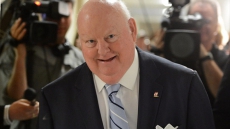EDMONTON — The Alberta election was supposed to be a coronation for Premier Jim Prentice — and it still might be.
But at the campaign's midpoint, the Progressive Conservative leader finds himself rewriting the script as he gets squeezed by the left-leaning NDP and by a Wildrose party dispatched into that good night returning to rage, rage against the dying of the right.
"I don't think (Prentice’s Tories) expected that the Wildrose would still exist," said Bob Murray, vice president of research with the Frontier Centre for Public Policy.
"The fact that the Wildrose is polling as well as it is in rural areas and its message is resonating, (the Tories) feel that they're going to have to up their game and go more on the offensive and move the party to the right."
Things looked a lot simpler for Prentice in December when he effectively crushed the Wildrose, a party of fellow conservatives with a strong rural base.
Many of them had left the Tory tent to protest record spending under former premiers Ed Stelmach and Alison Redford.
But with Prentice preaching fiscal rectitude once again, Wildrose Leader Danielle Smith led eight caucus members across the floor, leaving a rump of five on the other side of the aisle.
With the right more or less secured, it was believed Prentice was free to clean up on the NDP and secure a 13th consecutive PC majority in an election called a year before required.
But it hasn't worked out that way.
The Wildrose has rallied under a new leader named just days before the campaign, former Conservative MP Brian Jean.
Opinion polls have the NDP, the Wildrose and the Tories meeting in the middle with the opposition parties trending up and the Tories trending down.
Jean is proposing a plan to avoid tax hikes and balance the budget by, among other things, jettisoning thousands of civil service management jobs and reprioritizing infrastructure plans.
He has accused Prentice of losing his fiscally conservative nerve by running on a centrist budget of tax hikes, deficits, and debt.
Political scientist Duane Bratt said the Tories misjudged the anger Albertans felt over the floor cross and Prentice’s tough-love budget, but noted it’s hard to make broad assumptions on rural ridings.
"Rural campaigns are about family and friends and about being at the local coffee shop," said Bratt with Mount Royal University in Calgary.
"Those are tough campaigns to measure because you have to go beyond the leader's tour and you have to look at almost every riding individually."
Prentice tacked his party right this week to attack the Wildrose head on, announcing that he will chop a quarter of Alberta’s 320 agencies boards and commissions this year.
He also announced he would offer no wage hikes to unionized staff until the budget is balanced and he dispatched six cabinet ministers to attack gaps in the Wildrose budget plan.
But Prentice must also contend with a surging NDP, which Murray said has become the progressive alternative.
The NDP, with new leader Rachel Notley, is fighting to expand beyond its Edmonton base.
With a recent spike in fundraising — $406,883 in the first three months of this year — it is running cheeky TV ads featuring Notley, the daughter of popular former NDP leader Grant Notley, in her best bedside manner urging Albertans to "kick the PC habit."
The broad PC strategy, say observers, is for the Tories to retain their traditional popularity in Calgary and by tacking right, lose ground to the NDP in Edmonton in order to regain some of the lost support in the rural Wildrose areas.
Both Murray and Bratt said that despite the PCs' problems, it's hard not to think they will win the minimum 44 of 87 seats needed to form a majority government on May 5.
The PCs had 70 seats at dissolution.
Pollster Janet Brown said while she believes the early polls are over emphasizing anger with the Tories, Thursday's televised leaders' debate "has the potential to be a big turning point."
"A bad performance — or an exceptionally good performance — by one of the leaders could turn the tides."




